Press Contacts:
For interview opportunities with members of The Colorado Health Foundation, the research team and/or representatives from partner organizations and Colorado residents directly impacted by the topics covered in the 2022 Pulse Poll, please contact:
Marty Schechter (ENGLISH), marty@schechterpr.com, 303-882-4585
Virginia Ovejero (SPANISH), virginiaovejero@yahoo.com, 303-324-5075
Austin Montoya (For CHF Inquiries), amontoya@coloradohealth.org, 303-953-3686
FOR IMMEDIATE RELEASE
Aug. 21, 2023
DENVER, COLORADO – Four core themes emerged as significant and growing concerns for Coloradans, according to findings from the Fourth Annual Pulse Poll commissioned by The Colorado Health Foundation (CHF). A bipartisan team of researchers collected responses from 2,639 adults between April 8 - May 3, 2023.
The additional results from this year’s Poll come on the heels of CHF’s initial poll results released in July, which revealed more than 80% of Coloradans reporting that the cost of living and housing affordability topped their list of serious concerns. The August release includes potential solutions and a more detailed look at how four core issues impact specific demographics based on race or ethnicity, income level, geography, age, partisan affiliation and more.
While the cost of living and housing concerns have remained consistent over the past few years, the 2023 Pulse Poll revealed growing concerns for an expanding list of issues, including some staggering numbers related to mental health strain and health care; concerns tied to gun violence, drug and alcohol use; concerns about the effectiveness of state government; as well as the environment, including wildfires and other natural disasters.
“In this year’s survey, Coloradans make clear that the end of the pandemic has not meant the end of the state’s mental health crisis. More than two-thirds rate mental health a ‘very serious’ problem in Colorado – a much higher level of concern than we see for crime, gun violence, drug overdoses, wildfires or climate change. And for most Coloradans, the mental health crisis is personal – nearly three in five say they personally have experienced mental health strain in the past year,” said Dave Metz, Democratic pollster for Pulse and president of FM3 Research.
As you explore the additional findings from the 2023 Pulse Poll, note that The Colorado Health Foundation has assembled a list of experts who are available to connect with members of the media. Click here to access the list of experts.
Theme #1 Concerns About Health Care, Mental Health and Drug and Alcohol Use
Significant portions of Coloradans report mental health strain with financial challenges delaying or preventing care.
Concerns related to mental health continue to rise with nearly seven out of every 10 respondents (69%) saying it is a very serious problem, up from 55% in 2020.
Perhaps most concerning in that growth is the 57% of Coloradans who reported that they’ve experienced mental health strains such as anxiety, depression, loneliness or stress in the last year and that one in four people surveyed said they have postponed seeking mental health care in the past year, primarily due to financial challenges. Those numbers become even more alarming for specific groups of people. (see charts below)
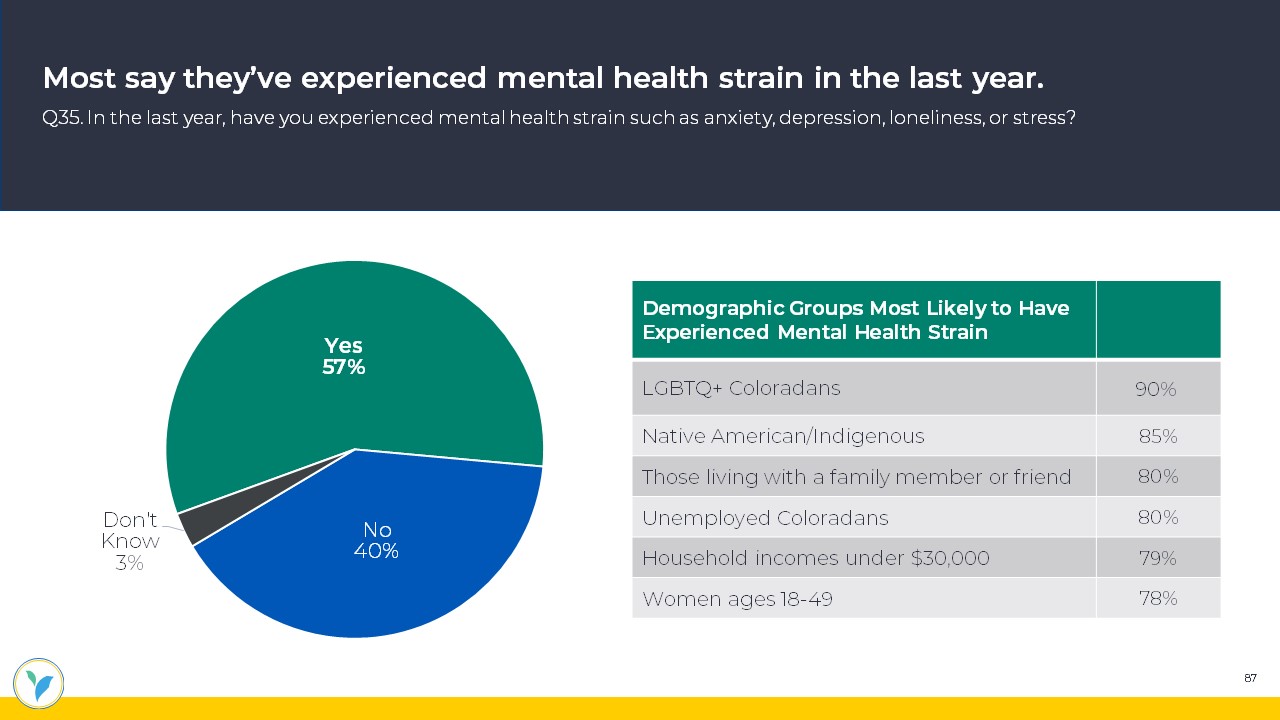
Nearly half of people who are very worried about losing their home in the next year or not being able to feed themselves or their families in the next year because they can’t afford it have also postponed mental health care in the last year.
Of those reporting mental health strain in the past year:
- 40% report postponing mental health care.
- Approximately three out of four people are discussing their concerns with friends or family members, while only 40% are discussing them with a professional health care provider.
- African American/Black respondents have the highest percentage of people saying they’ve talked with a professional health care provider about their mental health concerns (52%), but also the highest percentage saying they haven’t talked with anyone at 23%.
Asked why they’ve postponed medical, dental or mental health care in the last year, 75% of the responses were related to cost and ability to pay for the services.
"Usually, it is the big numbers in a survey that stand out. But there's a relatively small number – 14% – that leaped off the page,” said Lori Weigel, Republican pollster for Pulse and principal of New Bridge Strategy. “Fourteen percent of Coloradans say they have experienced mental health strain but have not talked to anyone – not friends, not family, not a professional – about this problem. That 14% represents hundreds of thousands of Coloradans who are suffering silently."
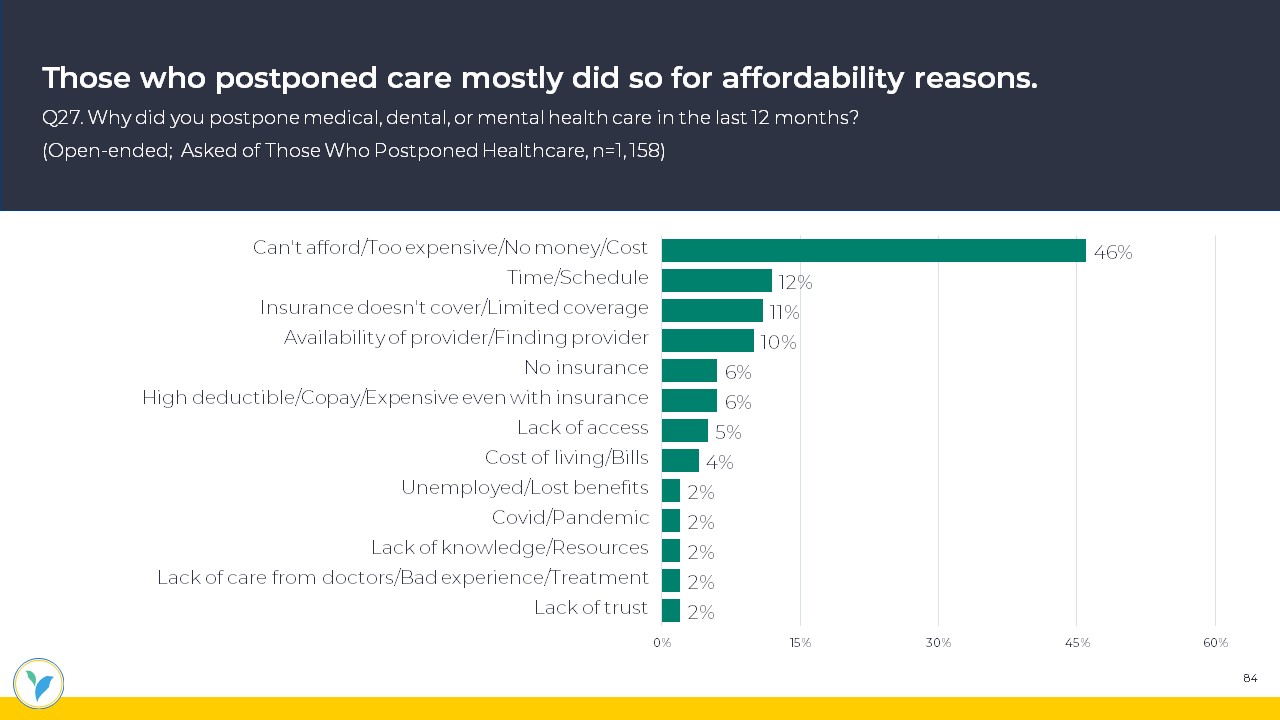
A variety of mental health solutions are seen as effective.
Asked about actions that could improve mental health services in Colorado, respondents saw several as effective, including “making it easier for people to receive mental health screenings and services at the same places where they get care for their physical health” (86% effective) and “pairing mental health professionals with law enforcement to respond to mental health emergency calls” (78% effective).

Challenges continue in accessing and paying for health care.
Another alarming finding from this year’s poll, 38% of respondents said they have postponed medical or dental care in the last year, with even more staggering numbers across categories that include renters, people with lower incomes, people with disabilities, as well as LGBTQ+ and Native American/Indigenous people. (see chart below)
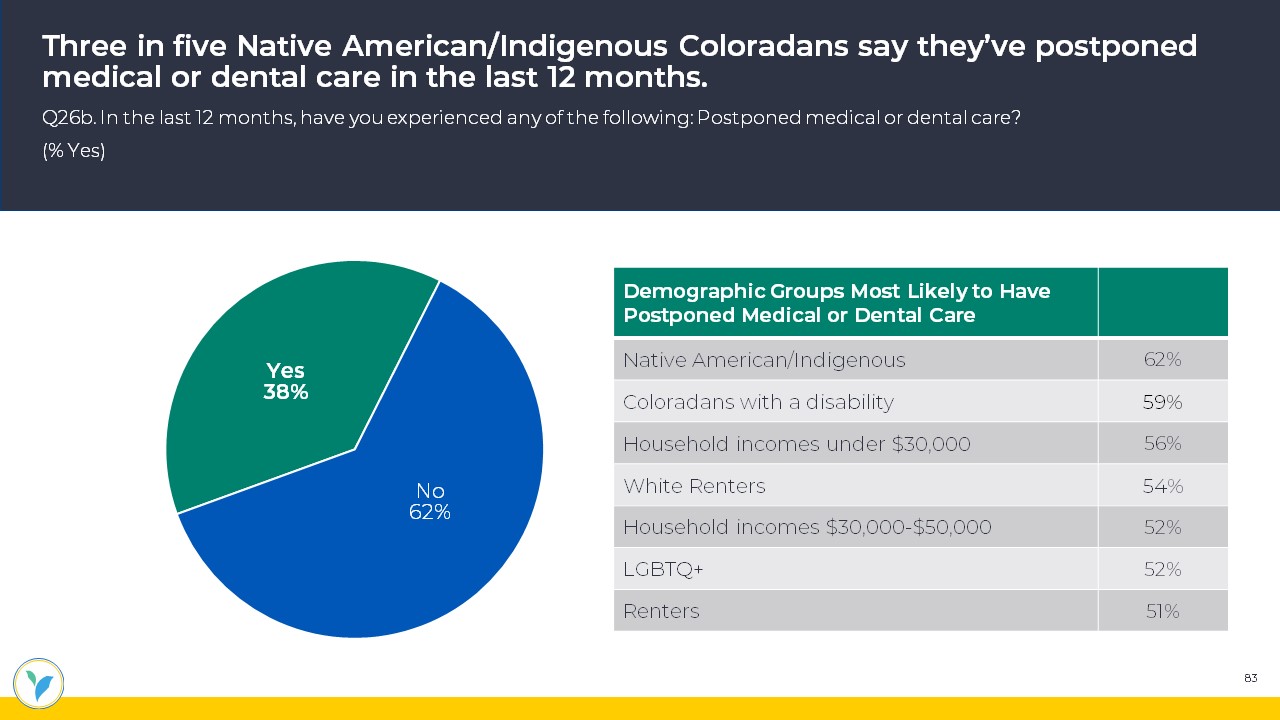
Nearly four in 10 (37%) respondents are worried they or someone in their household will be without health insurance in the next year. This includes 44% of people on public insurance such as Medicare or Medicaid as pandemic-related emergency measures that temporarily changed policies related to public health insurance coverage come to an end. Again, the numbers are even higher for people of color, including Black/African American (40%), Hispanic/Latino (55%) and nearly 70% of Native American/Indigenous respondents.

Even more troubling, nearly one in four Coloradans say they or someone they know has experienced unfair treatment when seeking health care services as a result of their race or ethnicity.
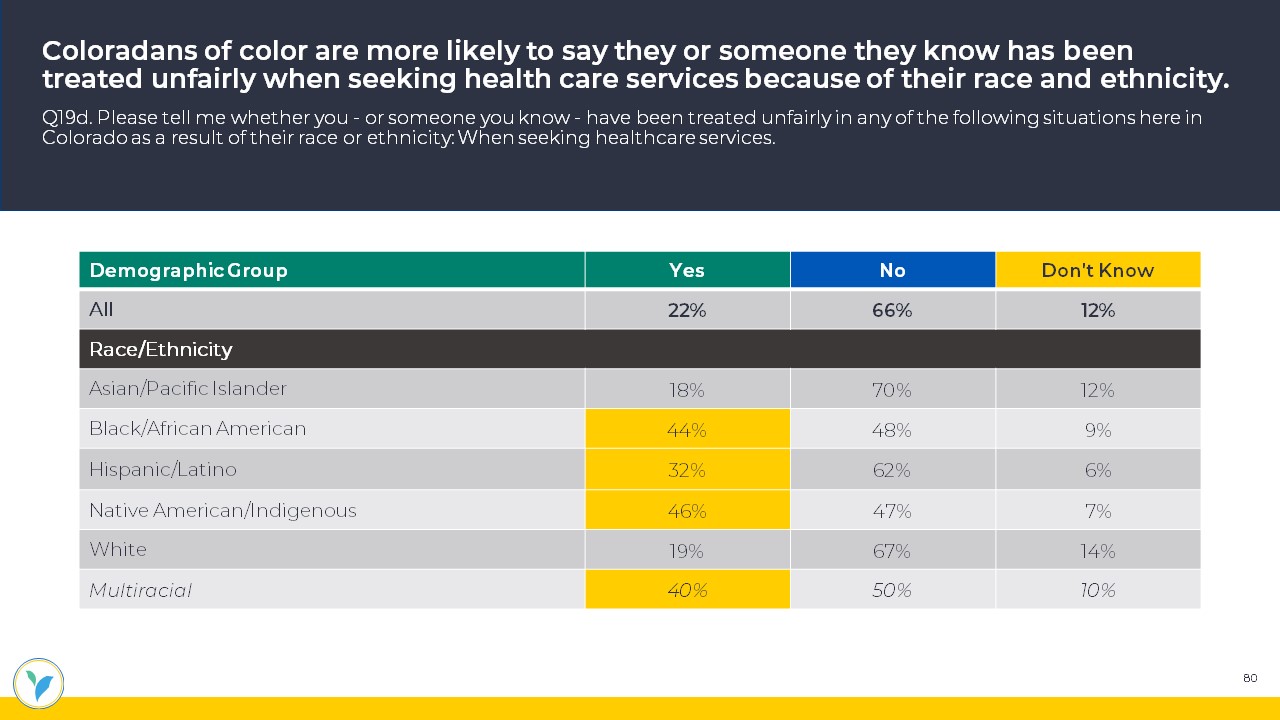
Theme #2: Crime and Gun Violence
Gun violence concerns are at an all-time high in the Pulse Poll.
Concerns about gun violence increased a staggering 13% between 2022 and 2023, the only category that experienced double-digit growth. Closely connected, concerns about crime rose to an all-time high of 61% compared to 57% in 2022 and 41% in 2021.

Pulse Poll respondents were asked to evaluate a wide range of topics as extremely serious, very serious, somewhat serious, or not too serious a problem in Colorado. Many of the key topics and metrics show very little change over time in levels of concern when tracked across specific racial and ethnic groups.

Looking at a partisan breakdown of the top concerns, Democrats and Republicans split opinions the most when it comes to levels of concern tied to climate change, gun violence and illegal immigration, while Independents end up in the middle. Levels of concern are more similar when it comes to the rising cost of living, homelessness, cost of health care, mental health, as well as drug and alcohol use.
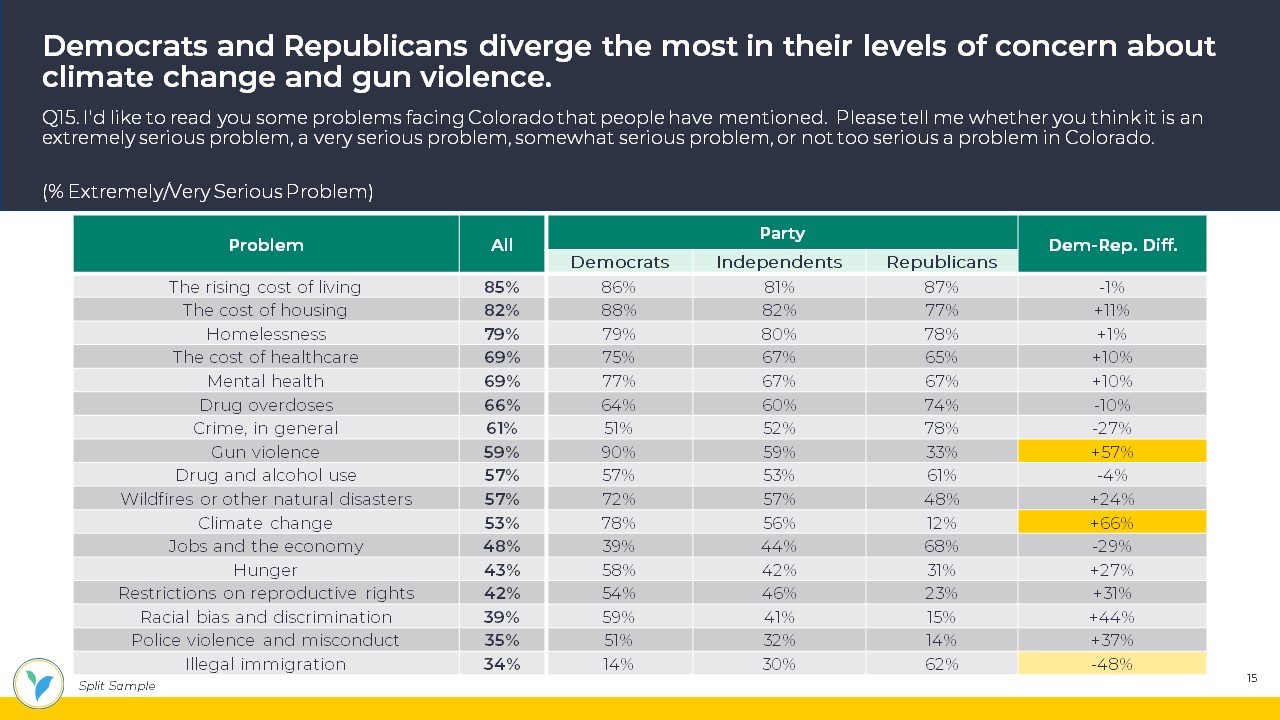
Theme #3: Concerns About How State Government Operates
For the first time, Pulse includes a deeper exploration of public sentiment about state government effectiveness.
In recent years, when asked in an open-ended question, Pulse respondents have consistently put concerns about “government” and “politics” near the top of the most important issues facing Colorado right now. In 2023, government/politics was volunteered as a top concern by 13% of respondents, ranking above the other topics included in this release. This year’s poll looked to dig deeper into this topic to shed light on people’s specific concerns people have. For the first time in the four-year history of the poll, respondents were asked about their feelings, attitudes and perceptions concerning the effectiveness of state government and potential solutions that could make the government better at serving people like them.
"Concerns about government and our political system are just behind concerns about the cost of living and housing when we asked Coloradans for the top problems facing the state,” said Weigel. “And, they are ahead of some of the more headline-grabbing issues like crime or homelessness. In fact, underlying many of the concerns people have for Colorado is the deeper sense that government may not be up to meeting the challenge."
In general, respondents are split on their satisfaction with state government, while across all political affiliations and demographics, Coloradans don’t feel that the voices of people like them are heard by policymakers when they are making decisions that impact the state.
Coloradans are split on whether they are satisfied (52%) or dissatisfied (45%) with the state government in Colorado and how well it works for people like them.
The most satisfied are Democrats and people living in Denver and Douglas counties, while the least satisfied are Republicans and people living in Adams and Pueblo counties.
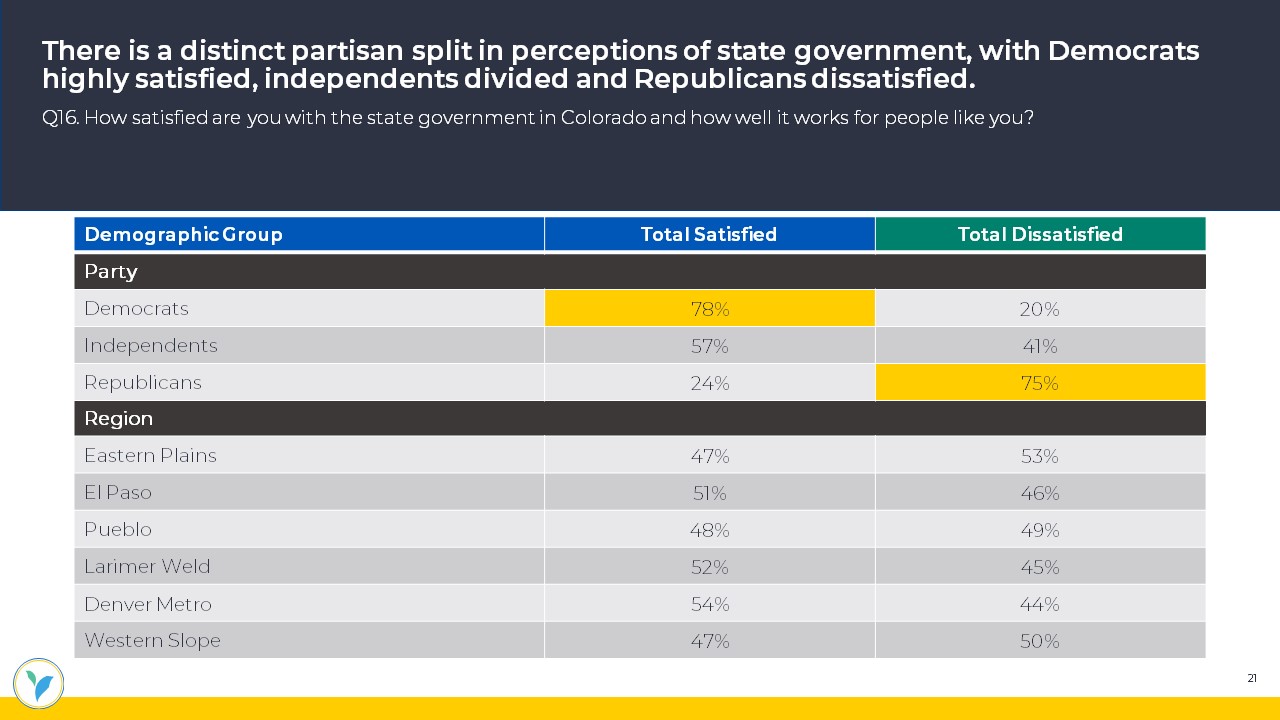
“For the first time in 2023, Pulse takes a closer look at a top concern that many Coloradans have named in each year of the four years of the poll: government and politics. Through this deeper exploration, we heard that many Coloradans have concerns about how well our state government works for people like them, but at the same time, there is also widespread confidence that there are some changes to how government operates that could truly make it more effective,” said CHF Senior Director for Policy Advocacy, Kyle Rojas Legleiter.
Respondents also shared a lot of frustration around the challenges that they believe are keeping their voices from being heard in state government.
- 91% say that “political polarization and a lack of compromise between parties” is a challenge, with 73% saying it’s a major challenge.
- 88% say that policymakers’ limited understanding of respondents’ needs or concerns is a challenge.
- 87% say the strong influence of lobbyists and corporate interests is a challenge, with 68% saying it’s a major challenge.
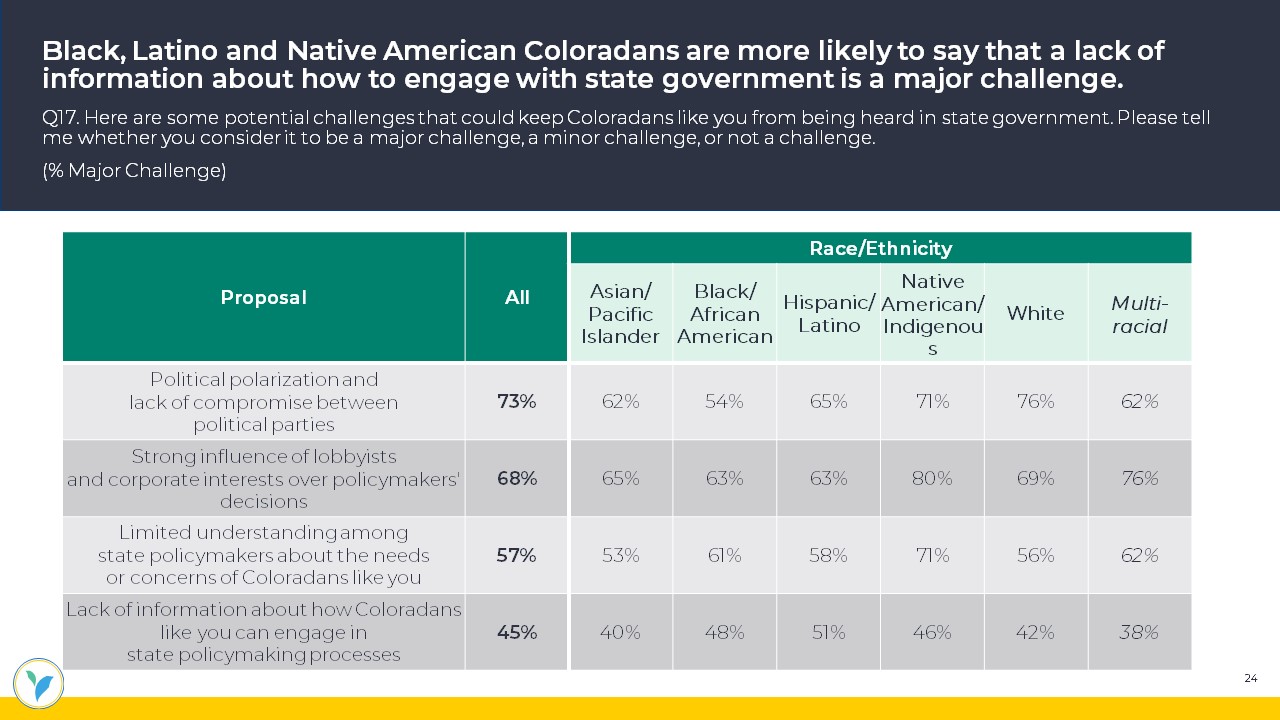
When asked about some actions that could improve how policy decisions are made, respondents saw several as effective, including “requiring policymakers to consider the long-term financial impacts of their decisions” (83% effective), “making it easier to access information about how the public can participate and comment on policy decisions” (82% effective), and “requiring policymakers to regularly engage with and listen to Coloradans in a meaningful way” (81% effective). The high levels of support for these solutions remain consistent across income level, partisanship, demographics and geography.
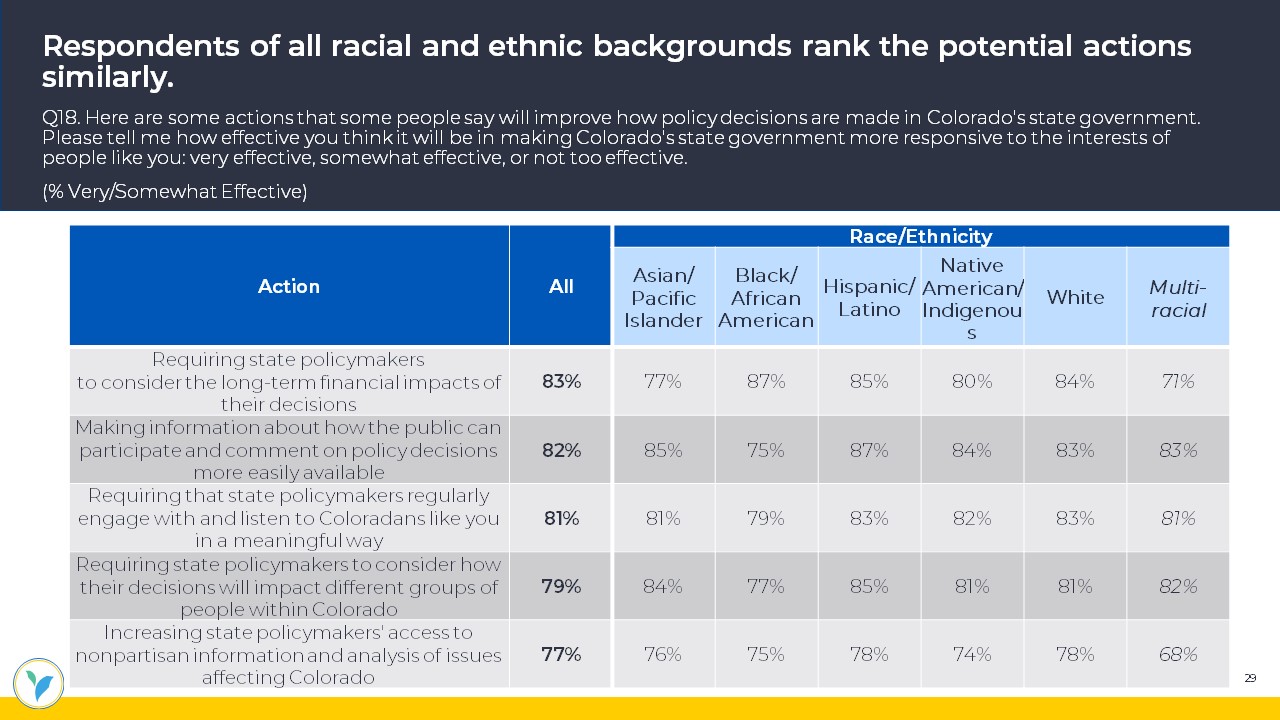
“Coloradans’ attitudes toward state government are best described as ‘lukewarm.’ While a slim majority indicates satisfaction with state government’s performance, those who are unhappy feel much more strongly,” added Metz. “Fewer than one in five label themselves ‘very satisfied’ – less than half the number of people that say they are ‘very dissatisfied.’ These views may reflect some specific ambivalence about policy decisions at the state capitol in Denver, but it also likely reflects a pervasive cynicism about government at all levels that has been growing across the country for decades.”
In addition to the Pulse findings on this topic, CHF’s policy advocacy team recently completed a series of in-depth interviews with the goal of understanding where there are opportunities to make state rulemaking procedures and processes of the state legislature more transparent, equitable and inclusive. The Foundation is in the middle of this important exploration, and Pulse provides an opportunity to more deeply understand public sentiment on these topics.
Theme #4: The Environment
Concerns remain high regarding wildfires, natural disasters and climate change.
A strong majority (57%) of respondents expressed concern about wildfires or other natural disasters. Those concerns remain relatively consistent across demographics.
Fifty-three percent of respondents expressed concern about climate change. Some higher levels of concern were reported by people living on low incomes (62%), AAPI (60%), Native Americans (59%), and people 18-49 (58%).
REGISTER FOR PULSE BRIEFINGS
The Colorado Health Foundation hosts public briefings to provide insight and perspectives on its annual Pulse Poll findings. Members of the public are invited to join one or both of the final two briefings for the 2023 survey.
- Beyond the Numbers: Understanding Coloradans’ Priorities From The 2023 Pulse Poll
(presented in English with live interpretation in Spanish)
Regionally-specific data will also be available and provided upon request
Data available online at 8 a.m., Monday, Aug. 21
Briefing at 10 a.m., Tuesday, Aug. 22
- Deep Dive with an Emphasis on Responses from Hispanic and Latino People in Colorado
(presented in Spanish with live interpretation in English)
Data available online at 8 a.m., Monday, Sept. 18
Briefing at 10 a.m., Tuesday, Sept. 19
Each briefing will share detailed data about the challenges Coloradans are facing, the impact of those challenges and the types of solutions that people want to see prioritized by policymakers.
The following resources are available for download.
The Colorado Health Foundation is committed to transparency, including access to the full results of Pulse. These resources are available in both English and Spanish and include:
- Questionnaire with topline results (English | Spanish)
- Cross-tabs with data on how different sub-groups answered each question (English | Spanish)
- Presentation deck with easy-to-read charts and graphs (English | Spanish)
About The Colorado Health Foundation
The Colorado Health Foundation is a nonprofit, nonpartisan organization bringing health in reach for all Coloradans by engaging closely with communities across the state through investing, policy advocacy and research. For more information, visit www.coloradohealth.org.
About Pulse
At The Colorado Health Foundation, we believe in the importance of listening, and that’s why each year we listen to Coloradans from across the state through our annual poll. From the increasing cost of living and lack of affordable housing, to health care and mental well-being, our poll takes the pulse of Coloradans on a range of important issues this year and every year – to inform policy that advances health equity. For more information, visit www.copulsepoll.org.
The 2023 Pulse Poll was conducted by telephone and online from April 8-May 3, 2023 among a random representative sample of 2,639 adults age 18 and older living in Colorado. The margin of sampling error for the full sample is +/-2.2% at the 95% confidence interval. For results based on subgroups, the margin of sampling error is higher.
The final results of this year’s Poll will be shared in September with a more in-depth look at the perspectives of Hispanic and Latino respondents.
# # #
